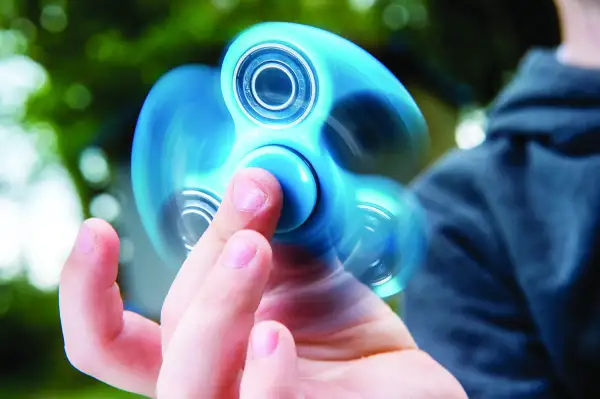More Schools Are Banning Fidget Spinners Because They Are 'Highly Distracting'

Fidget spinners, the hot new toys that are supposed to help kids focus, are being banned in schools—because they're too distracting.
The fidget spinner, for the uninitiated, is a simple mechanical gadget with bearing in the middle that allows you to spin it smoothly and entrancingly in your hand.
Amazingly, fidget spinners currently occupy every spot in Amazon's top 20 best-selling toys right now. Fidget spinner prices range from free (you just have to pay for shipping) all the way up to nearly $1,000, but the hottest sellers—including models from brands such as D-Joy, Amilife, and Balai—are listed for around $4 on Amazon and generally come with free shipping.
What sets fidget spinners apart from toy crazes in the past is that they're not being pitched as mere fun playthings. Instead, they were invented to help children focus better, and they're regularly marketed with messages claiming they relieve stress, anxiety, ADD, and ADHD. Fidget spinners from Evermark, for example, state that they are "Great for Anxiety, ADHD, Autism, Quit Smoking, Staying Awake On Long Car Drives, Etc."
Yet while kids—and quite a few adults—are infatuated with fidget spinners, the products have come under fire from teachers and schools across the country. Ironically, the gadgets that are billed as beneficial for focus have been banned from one middle school in Massachusetts because they are "highly distracting to students and those around them." A message placed last week on the Nissitissit Middle School's website states plainly, "Students should not bring spinners to school."
The Chicago Tribune reported that at least two schools in the Chicago suburbs also banned fidget spinners. "Frankly, we've found the fidgets were having the opposite effect of what they advertise," said Kate Ellison, the principal at Washington Elementary School in Evanston, Ill., which recently announced a spinner ban. "Kids are trading them or spinning them instead of writing."
The list of places where schools have banned fidget spinners also includes Brooklyn, Connecticut, Florida, Indiana, and even the U.K. What's more, the war on fidget spinners in the classroom is likely to spread—because teachers and school administrators feel like the toys are making it harder to educate children, and the craze shows no signs of slowing down. As a Working Mother headline observed earlier this week: "Your School Is Probably About to Ban Fidget Spinners."
Students with diagnosed conditions are generally still allowed to bring fidget spinners into schools that have banned them. The real problem, educators say, is that the majority of children who are fascinated by fidget spinners are using them as a fun distraction, not for any therapeutic reason.
“Fidget spinners are being misused by children who don’t know what they’re intended for," one private school teacher in Queens told the (New York) Daily News. "They’re using them as a game to see who can balance them longer or spin them faster.”
And obviously, if the kids are focused on a fidget spinner game or competition, they're not paying much attention to anything else happening in the classroom.
We’ve included affiliate links into this article. Click here to learn what those are.
